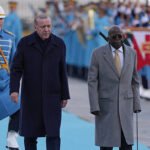
Culled from NewsNav
Malaysia’s stance on the Israel-Hamas war has unexpectedly thrust the country into the midst of a politically charged situation.
Prime Minister Anwar Ibrahim has vowed to maintain ties with Hamas, even if the Malaysian government faces external pressure. Anwar has been one of the most vocal leaders in criticizing Israel, denouncing its military operations in Gaza as the “height of barbarism.”
While this has gained him popularity among the Muslim majority in Malaysia, it has put the country at odds with the US, its third-largest trading partner.
The Malaysian government has not explicitly stated that it is pro-Hamas, but it maintains ties with the group and reserves the right to engage with them in order to find solutions to the ongoing crisis with Israel.
Malaysia views Hamas as the legitimately elected leader of Gaza, despite the lack of elections in the enclave since 2006. Malaysia has long supported a two-state solution, which advocates for separate, independent nations for Israelis and Palestinians to share the Holy Land. In support of the Palestinians, Malaysia has taken various actions.
Political leaders have participated in pro-Palestinian rallies and discussed support for the Palestinian cause in Parliament. The Malaysian education ministry organized a Palestine Solidarity Week program in schools and colleges, and the government manages a Humanitarian Trust Fund for the People of Palestine.
Malaysia has also maintained reciprocal embassies with Palestinian authorities and has provided medical aid, food, and basic necessities to those affected by the war.
Malaysia’s relationship with Israel has been strained for decades. When Malaysia gained independence in 1957, Israel supported its admission into the UN and traded with the country.
However, Malaysia’s first prime minister, Tunku Abdul Rahman, decided to eschew formal diplomatic ties with Israel to bolster the country’s Islamic image.
Malaysian passports now contain an inscription stating that they are valid for all countries except Israel, and Israeli passport holders face restrictions on entering Malaysia.
Religion plays a role in Malaysia’s stance, as the country’s foreign policy emphasizes the solidarity of the Muslim community.
Some political analysts suggest that Anwar’s support for Palestinians may be driven, in part, by a desire to strengthen his Islamic credentials.
Anwar has raised the Palestinian issue during his visits to Saudi Arabia, Iran, Egypt, and the UAE, and has called for an emergency meeting of the Organisation of Islamic Cooperation (OIC) on the matter.
He has also emphasized that the war is a humanitarian crisis that affects both Muslim and Christian Palestinians.
Ordinary Malaysians have expressed support for the Palestinian cause through street protests and boycotting fast-food establishments perceived to have ties to Israel. Malaysia’s stance on the Israel-Hamas war has affected its relationship with the US, with Washington criticizing Malaysia for taking a hard line against Israel’s actions.
Nevertheless, Anwar continues to seek new US investment, indicating that policy differences have not halted economic pursuits. Among other Southeast Asian countries, Indonesia supports the Palestinian struggle for independence and does not have diplomatic ties with Israel. Singapore believes in a two-state solution for peace.
Thailand maintains neutrality, while the Philippines swiftly condemned Hamas and recognized Israel’s right to self-defense.
Both the Philippines and Thailand have significant numbers of migrant workers in Israel and Gaza, and some were reportedly among the hostages taken by Hamas.
In conclusion, Malaysia’s stance on the Israel-Hamas war revolves around maintaining ties with Hamas to find solutions to the ongoing crisis with Israel.
This position has gained popularity domestically but has strained Malaysia’s relationship with the US.
The country supports the Palestinians through various means and emphasizes the solidarity of the Muslim community in its foreign policy. Ordinary Malaysians have shown support through protests and boycotts.
Other Southeast Asian countries have varying positions on the conflict, ranging from support for the Palestinian struggle to neutrality and condemnation of Hamas. NewsNav / Flowerbudnews
M
felixwrite is a content creator under the Newswav Creator programme, where you get to express yourself, be a citizen journalist, and at the same time monetize your content & reach millions of users on Newswav










